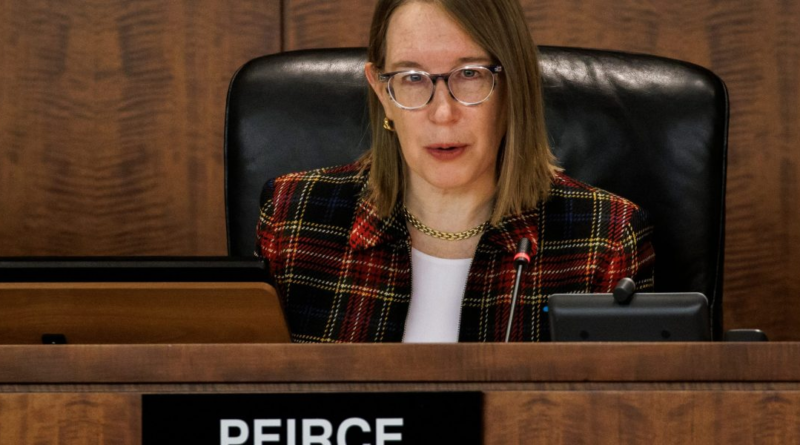SEC commissioner lets rip on Chairman Gary Gensler’s leadership for ‘stilted communication’
Securities and Exchange Commission regulator Hester Peirce is disappointed by what she sees as a lack of effort from her agency to engage with the public—and she put the heat on her colleagues to change the agency’s culture in a speech on Tuesday. But a former SEC chief accountant says she’s missing the point, and that Peirce’s proposals would undermine the SEC’s regulatory capability.
At the SEC Speaks event in Washington, D.C. Tuesday, Peirce blamed SEC employees for “the dwindling of genuine commission and staff engagement with the public.”
But Lynn Turner, who served as the SEC’s chief accountant from 1998 to 2001, told Fortune that Peirce’s speech omitted key details and sent the wrong message about an agency that, by design, requires work between SEC staff and stakeholders outside the lengthy formal rulemaking process to respond to market trends and innovations.
“If that speech had to be transparent in the way SEC filings have to be, she’d be subject to SEC enforcement,” Turner said.
Under Chair Gary Gensler, whom President Joe Biden nominated to lead the agency in 2021, the SEC has taken an aggressive regulatory stance, pushing for new policies related to topics as diverse as climate disclosure, cryptocurrency, and money-market funds.
But critics, including Peirce—one of two Republican commissioners on the SEC’s five-person board—say that the agency’s fast-paced rulemaking has come at a cost, limiting its capacity to slow down and engage in the dialogue with stakeholders she says is a vital part of the agency’s mission.
“The commission—not the staff or market participants—is to blame,” Peirce said. “One manifestation is the way rules are made these days: very broad proposals, unreasonably short public comment periods, pared-back final rules with substantial elements on which the public has not commented, and little SEC engagement in implementation discussions.”
Peirce pointed to SAB 121, interpretive guidance on companies dealing with crypto assets that the SEC issued in March 2022. Instead of soliciting comments and putting it to a vote, the SEC’s Office of the Chief Accountant, which reports directly to Gensler, prepared and issued SAB 121 independently, basing it on standards set by the Financial Accounting Standards Board.
Even though SAB 121 wasn’t an official SEC rule, just guidance, it made a splash—prompting companies and auditors to scramble to review their policies and prepare for potential enforcement. The policy’s headline guidance requires companies that hold crypto assets for customers to log them as liabilities on their balance sheets and maintain additional liquidity to repay customers in the event of a hack.
“SAB 121 is nonbinding staff guidance that, if followed, enhances important disclosure to investors in firms that safeguard crypto assets for others. Time and again we have seen crypto firms fail and watched as their customers lined up at the bankruptcy court in hopes of getting what they thought was legally theirs,” an SEC spokesperson told Fortune.
Pushing for open dialogue
Peirce said that forgoing a formal comment period and board vote is the opposite of how the SEC should be going about things. Instead, she said that maintaining open dialogue between the agency and the companies it’s regulating is a vital part of its mission. Peirce wrote in a response to SAB 121 that “if we are trying to encourage companies to enter our public markets, we ought to embrace a more deliberate approach to changing rules—one that involves consulting with affected parties.”
Historically, some of the dialogue between the SEC and regulated entities has come in the form of no-action letters in which companies can request comment from the SEC on whether a potential action on their part would violate regulatory guidelines. The number of those letters filed fell from 224 in 2021 to 116 last year, suggesting that companies might be getting less comfortable going to the SEC for guidance.
“Countless people have told me that they used to feel comfortable coming in and speaking with the commission and its staff, but no more,” Peirce said. “The root of the problem … is that the commission discourages the staff from offering much more than silence, shrugs, sighs, and slow-walking. The culture at the top of the SEC has changed, which in turn has changed the way the agency interacts with the public.”
Peirce’s suggestion would kneecap the SEC, bogging it down with so many administrative responsibilities that it would struggle to do its job, Turner told Fortune.
“She goes in there, and she starts talking about how everything should be subject to official rulemaking … If the SEC follows what she says, staff no-action letters will now have to be voted on by the entire commission,” Turner said. “This will make it difficult and slow for market participants to [get] answers they want.”
Turner pointed out that SEC’s comment periods, such as for proposed major rules on auditor independence, are typically much longer than the minimum guidelines mandated by the Administrative Procedure Act passed by Congress (usually 30 to 60 days). For example, the comment period for the SEC’s recently enacted climate disclosure rule was more than 100 days long.
Turner disagreed with the nature of Peirce’s comments, which he said amounted to targeted attacks at other SEC officials.
“She took a direct swing at Chairman Gensler, with a bat,” Turner said. “That’s not how you compromise.”
Peirce struck a more cordial tone in a note to Fortune: “Chair Gensler and I have frequent, cordial, and lively discussions about policy and process and respect one another’s viewpoints,” she wrote.
Editor’s note: The final paragraph of this story was updated to include a comment from SEC Commissioner Hester Peirce.




